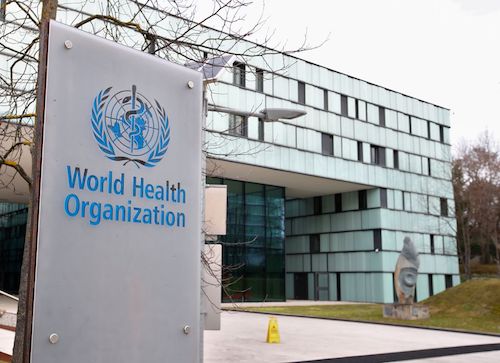Introduction
Amid the outbreak of coronavirus, the world is again witnessing the change in prevailing shift in the use of conventional forces to weapons of mass destruction. With the introduction of ballistic missiles as nuclear warhead in the twentieth century that could potentially be fired from the territory of one state and wreak great destruction on the home territory of other states, it was believed that the world had witnessed its days of wars with regular military forces. As things stand today, with the advancement in science and technology and the world rapidly growing as a global village, our notion regarding modern international and national security, unlike traditional view, need to past both military and nuclear considerations. It needs to include various aspects like political, economic, digital security, health & water security, environment and climate change, and above all, the COVID-19, a declared pandemic.
Health Security & Role of World Health Organization (WHO)
The world’s habit of learning a major lesson the hard way is not unprecedented. The corona pandemic has thought us all that the world does not need a good or advanced military system to combat/prevent emerging diseases, what it needs is a developed medical and health care system to protect us from such diseases. It is the health care facilities that needs to be improved, developed and prioritized for the time to come, not the military spending. War not only stimulates high military spending, but it also destroys capital and causes inflation. Governments must pay for war goods by borrowing money, by printing more currency, or raising taxes. It would cause an increase of inflation, rise of state debt, and a reduction in investment and spending.
Given the recent weaknesses, vulnerabilities, and unpreparedness of the nations, including the great powers, that has caught all of them off guard, the most important change in the world security environment post COVID-19, in my humble opinion, would be the change in the shift from state security to human security. It means the security of people. It encloses their physical safety, health, economic and social well-being, inviolability of their dignity, and the protection of their fundamental rights. It has two main aspects. Firstly, protection from such chronic danger covering hunger and disease. Second, protection from abrupt and dreadful disruptions in daily life patterns, could be in homes, in jobs or in communities. In the contemporary realities, the world is faced with both aspects.
The right to health is akin to right to life. It means that everyone has the right to the highest attainable standard of physical and mental health. It comprises of access to all kinds of medical services including but not limited to hospitals, clinics, medicines and services of medical practitioners which must not only be readily available and easily accessible to everyone without discrimination, but also of a high standard. In addition to national law, international law also imposes a duty on the world states, being a member of United Nations and World Health Organization (WHO), to provide the health security to the people and to focus on developing the advanced health care system and management in their states.
The World Health Organization (WHO) role in fighting the virus is of much significance. The Geneva-based organization is an autonomous agency which maintains formal ties with the UN General Assembly in the area of health care. It is well-known for providing technical assistance to improve conditions and conduct major immunization campaigns in the world. Although, the WHO has already provided for the necessary measures for the public to prevent the pandemic from spreading including social distancing to regular hygiene until it finds a cure or vaccine. However, it is believed that the coronavirus is on the list of Immunization Agenda 2030 (IA2030) of the organization. It endeavours a healthier, safer and more prosperous world for all. The IA2030 strategy proposes for every nation the full benefits from vaccines to improve health and well-being. Based on ‘bottom-up’ co-creation process, the strategy embraces key principles confining people in the centre, led by countries, implemented through broad partnerships, and driven by data.

Hence, for the ongoing reasons, an inference can be drawn that there will be no deconfinement or end to social distancing without universal mandatory immunization, and subsequently the imposition of the electronic vaccination record by implanting a subcutaneous chip, which in collaboration with several official bodies around the world has been on promotion list of the Bill and Melinda Gates Foundation for years. The placing unequivocally will help identification, tracking and location of individuals. Such extensions of digital and technological surveillance, however, could be a dangerous precedent. The degree of monitoring and state intervention in the lives of people would result in a number of serious consequences such as violability of their dignity and privacy, undermining the values of freedom and liberty, a trust deficit and confidence between the government and its subjects, and above all, a huge blow to the liberal democracy and fundamental human rights. It would be a huge setback to the work of advocates of democracy and human rights, and the world would eventually start seeking towards something better.
Global Economic Security
Coronavirus, a divine retribution or a human biological attempt of mass destruction, yet to be stamped, nonetheless, has certainly taken hundreds of thousands of lives and brought the world to a halt. The economic security, which is the symbol of probable continued solvency, predictability of economic future of a country, employment security and stability of oil prices is threatened by the abrupt closure of commercial activity in every region of the world and sheer decline in oil demand. The world that emerges is likely to be confronted with many challenges on its road to recovery that include debt saturating loss to companies, a decline in stock markets, mass joblessness, and above all worldwide bankruptcy.
The shortage of food supplies, breaking of the logistics and the sky-high prices have already increased the risk of unemployment, joblessness, and food security in the world. In the process, all these factors could lead to political unrest, violence, conflict, exploitation, poverty, and depression, and eventually pave the way for dictatorship. Increasing rates of unemployment are raising the prospects of wide-spread social unrest and demonstrations in developed economies where lost incomes and health insurance are threatening living standards and in developing economies where populations reportedly are growing concerned over access to basic necessities and the prospects of rising levels of poverty.[1]
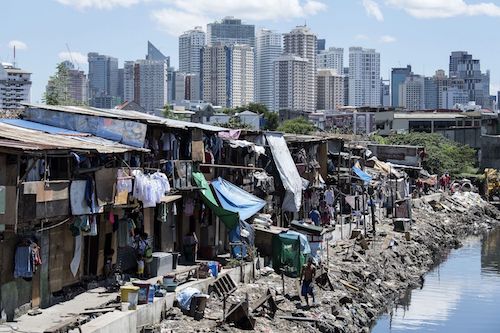
There has been a steep decline in the global trade and gross domestic product in the first quarter of the ongoing year. The international economic and trade activities among the world states have come to standstill. It encompasses services relating to tourism and hospitality, movement of medical supplies and other global value chains, consumer electronics, and decline in financial markets to energy, transportation, food, and social gatherings. The health and economic crises could last a negative impact on the economies of both the developing and developed countries. For the former, by overburdening the health systems in already limited financial resources, while adding the extra monetary costs in the efforts maintaining social distancing, in the latter case. Poverty, famine, hunger and structural violence are the reflection of the economic insecurity of states.
Although both the national governments and International Organizations have announced fiscal policy initiatives in response to the current pandemic. It covers measures regarding the provision of loans and other financial assistance such as Unemployment Benefits in America and Monetary Relief Package in Pakistan. In the contemporary reality of the emerging world order, the emergency compensation, however, could be the start of giving guaranteed minimum income for the people. This form of mass control system would propose a great solution to both the public at large and those in authority. Any deviance or disobedience on part of the general public will be reprimanded by the withdrawal of income and ousting/firing from a job. In this way, hence, the authority of those in charge and the public order, both are guaranteed. With the economy being centralized, the power to control and dictate the people, perhaps states too, becomes indispensable.
World Security Environment and New World Order
Notwithstanding the number of causalities as a result of current epidemic in the world, the tussle between great regional and international powers continues to grow. Their unwillingness to cooperate and will for dominance and dictating is still persistent. The desire to further strengthen their claim as regional & international bosses is not coming slow. The geopolitical rivalry between the neighbouring powers is back into the spotlight. The internal disturbances among different factions of the society in the country is on the rise.
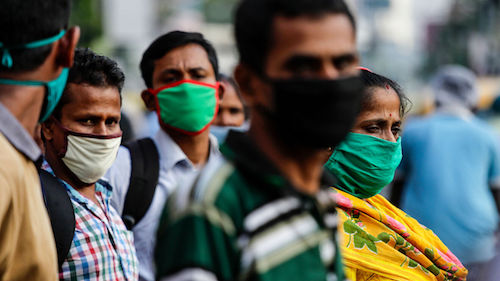
In India, for instance, Muslim communities, since the outbreak of novel coronavirus, have been at the receiving end, yet again. The Hindu extremists labelled them as carriers of COVID-19, thereafter, launching a discriminatory campaign and initiating a series of fresh attacks on the Muslim communities throughout India. Hence, further deteriorating the security conditions of the country. Similarly, during the prevailing pandemic, the already struggling communities in Palestine has been further paralyzed because of shortage of medicine and medical material in the country due to cruel and inhumane acts of Israel government.
Armenia, through holding of alleged presidential and parliamentary elections during the wave of epidemic in the illegally occupied areas of Nagorno Karabak (Azerbaijan), explicitly violated all the guidelines of World Health Organization (WHO) on COVID-19 including social distancing. In its attempt, Armenia tried to last pseudo impression of fair and transparent elections and supremacy of democracy in the region. For Azerbaijan, however, regaining every inch of territory, as per UN Security Council resolutions, is a matter of national honour and a symbol of sovereignty and territorial integrity that define Azerbaijan statehood.
A world order established on an idea of liberty, democracy, human rights, international law, global communications and financial networks stands at a turning point. The failure of the current US administration to manage the global pandemic at home and absence leadership in coordinating an effective response could mark another change in the world order. It has been the policy of the US governments to focus primarily on the traditional modes of national security for the last many years. For this reason, it has been spending more than $700 billion on defence and less than $2 billion on medical and health system. The huge difference between the two budgets has exposed the unpreparedness of the US to lead a global response as well as has caused a major shift in its global position. It is, however, imperative for the US leadership to expand the notion of national security to include things like pandemics, climate and environmental change, digital security to erase any doubts concerning its hegemony in the present world order.
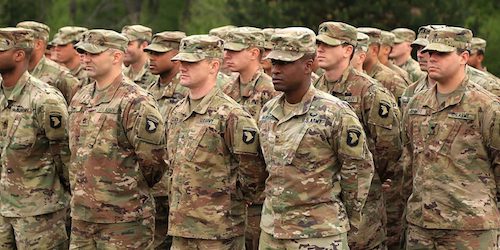
Despite having the relative strength in the form of world’s most powerful military and world’s largest single economy, the US leadership must have learnt by now that they cannot tackle the emerging problems in the world on their own. Besides, they cannot deal with climate change by themselves, and last but not the least cannot maintain global health unilaterally. The outbreak of the deadly virus has already endangered the American economy and its people leaving more than thousands of people dead and costing trillions of dollars to the nation. The missteps by formal institutions, with chain supply wanting, and lack of capacity to meet its own demands, let alone the financial and medical aid to corona affected zones, have but undermined confidence in the ability, capacity and competence of US governance. The media addresses by its President in the last two months were nothing short of confusion, despair and uncertainty.
Trump administration, unlike 2014-2015 one during the Ebola crisis, clearly failed to demonstrate effective and coordinated leadership skills against the global crisis. In these circumstances, on the contrary, China is rising quickly to the top and is filling the vacuum created by the US to position itself as the global leader in the pandemic. It is viewed as having both the ability and willingness to muster and coordinate a global response to the crisis. With projects like One Belt, One Road Initiative (BRI) and China-Pakistan Economic Corridor (CPEC) being underway, China has further accelerated the socio-economic integration and regional connectivity. The rise in number of the Chinese largest banks and companies in the international lists has additionally guaranteed its strong, stable and sustainable economic growth.
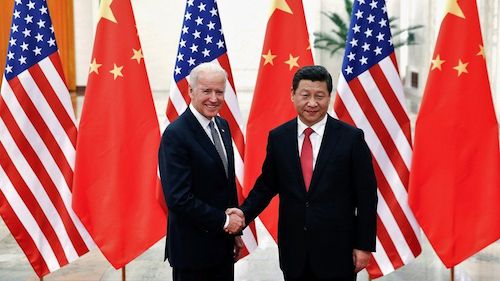
With US mapping out the strategies to make Chinse Government responsible and accountable for the spread of the virus in the world, the latter has been reaching out to other affected countries that are appealing for urgent aid with medical material assistance. During the prevailing crisis, China, unlike the US, did not abandon the world. It has come forward as a symbol of hope and saviour of humanity by producing, distributing and sending the medical equipment and protective gear to both the developed and developing countries such as Italy, Iran, Serbia, and others. While President Trump suspended the World Health Organization (WHO) funding criticizing that the organization failed to adequately obtain, vet and share information in a timely and transparent manner. The Chinese leadership has again taken one step further and has increased its share of sponsorship in the funding of the organization. The decision, no doubt, would strengthen the capabilities of the organization, enhance the international cooperation against the epidemic, and help various dependant countries. As per the report of US Strategic National Stockpile, the Western Leadership failed to recognize the inability of its both public and private sectors to produce and distribute the tools necessary for testing and response domestically, and eventually, China’s share of the US medicines and reserves of a medical supplies has tremendously increased. The Chinese Government, last but not the least, after coping with the coronavirus in its own country, exhibited its leadership skills at the global level by sharing information about controlling the pandemic with the world, by undertaking diplomatic campaigns, sending teams of doctors and nurses to affected countries, and above all distributing material assistance including masks, respirators, ventilators and medicine.
It goes without saying that what would be the future implications of the 1972 Biological Weapons Convention should the report of joint international investigation team relating coronavirus as a biological weapon comes positive. It is equally true that a single biological weapon could spark an epidemic in an entire population. For this reason, the development, production and possession of biological weapons are banned under the said Convention. The superpowers, though, had already destroyed their stocks of biological weapons and restricted their biological weapons to defensive research purposes. However, since the treaty makes no provision for inspection and as the biological weapons programs are cheap to manufacture and relatively easy to hide, the positive report of the investigation team would further ignite the race for more biological weapons, especially encouraging for poor nations.
Conclusion
To sum up, where the world has undisputedly enjoyed the benefits of globalization, it has equally made us vulnerable to non-traditional security threats including climate change, economic terrorism, and human infectious diseases such as COVID-19. The global lockdown during the outbreak of the pandemic must have given the time to the world to rethink, regroup, and expand their view of security from traditional to non-traditional ones. The world states, especially the great powers, need to pool in their efforts for mapping out a coherent, a comprehensive and an effective proactive and beforehand strategy to deal with the prevailing pandemic as well as future global disasters, particularly the climate change.
Last but not the least, it could be true that none of the International States have created the COVID-19. Be that as it may, each one of the States is certainly responsible for its global transmission and uncontrolled spread one way or the other. And all of them will face its music together coupled with all its terrible consequences to population and economics around the world.
The world is going through a very crucial phase of its survival both politically and economically. Taking more forceful swings at China might help President Trump administration politically and perhaps win him a second term as president, but these swings would only further tense their relations and leave former with no option except to retaliate which the world cannot afford at this pivotal moment. Since the world is considered as a single community, the need of the hour is to embrace the identity principle for our collective goods problems to have the successful cooperation and integration among the states, otherwise, the prevailing pandemic is just the beginning.


